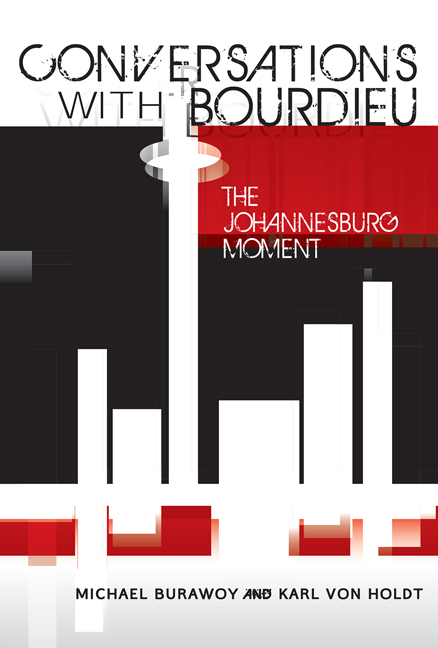Book contents
- Frontmatter
- Contents
- Abbreviations and acronyms
- Preface
- Prologue The Johannesburg Moment
- Acknowledgements
- CONVERSATION 1 SOCIOLOGY AS A COMBAT SPORT
- CONVERSATION 2 Theory and Practice
- CONVERSATION 3 CULTURAL DOMINATION
- CONVERSATION 4 COLONIALISM AND REVOLUTION
- CONVERSATION 5 PEDAGOGY OF THE OPPRESSED
- CONVERSATION 6 THE ANTINOMIES OF FEMINISM
- CONVERSATION 7 INTELLECTUALS AND THEIR PUBLICS
- CONVERSATION 8 MANUFACTURING DISSENT
- Epilogue Travelling Theory
- Bibliography
- Index
Preface
Published online by Cambridge University Press: 20 April 2018
- Frontmatter
- Contents
- Abbreviations and acronyms
- Preface
- Prologue The Johannesburg Moment
- Acknowledgements
- CONVERSATION 1 SOCIOLOGY AS A COMBAT SPORT
- CONVERSATION 2 Theory and Practice
- CONVERSATION 3 CULTURAL DOMINATION
- CONVERSATION 4 COLONIALISM AND REVOLUTION
- CONVERSATION 5 PEDAGOGY OF THE OPPRESSED
- CONVERSATION 6 THE ANTINOMIES OF FEMINISM
- CONVERSATION 7 INTELLECTUALS AND THEIR PUBLICS
- CONVERSATION 8 MANUFACTURING DISSENT
- Epilogue Travelling Theory
- Bibliography
- Index
Summary
My four-year stint with the Ford PhDs, which had brought me to the University of the Witwatersrand for three weeks every year, had come to an end. Karl von Holdt, then acting director of SWOP (the Society, Work and Development Institute) invited me to come to Wits for a semester on a Mellon Visiting Professorship. I would work with students and faculty and also give public lectures. There was interest in my giving lectures on the work of Pierre Bourdieu, which I had previously done at the University of Wisconsin. I revised and expanded these lectures from six to eight. As at Wisconsin, the idea was to bring together faculty and students from different departments and develop another side to SWOP's activities.
But Wits would be a different experience altogether, as Bourdieu was not the popular theorist in South Africa that he was in Wisconsin. After all, Bourdieu was not only a theorist of the North and from the North, but more specifically of France and from France, which made him more unfamiliar than Anglo-American theorists. His convoluted style of writing, his elliptical sentences, his erudition and his philosophical grounding – in sum, his deployment of cultural capital – make his work challenging to access.
As I had done in Wisconsin, I sought to interpret Bourdieu by presenting his ideas in relation to Marxism through a series of imaginary conversations between Bourdieu and Marx, Gramsci, Fanon, Freire, Beauvoir, Mills and myself, respectively. Bourdieu makes reference to Marx – indeed, his work is a deep engagement with Marx (as well as Durkheim and Weber) – but Marx never receives a sustained examination. As for Gramsci, Fanon and Beauvoir, his scattered references and footnotes are contemptuous, while Freire and Mills hardly get a mention. Nonetheless, there are some interesting parallels and convergences with these theorists that more often than not evaporate under closer examination. My endeavour was to rescue these figures buried in Bourdieu with a view to problematising both Bourdieu and Marxism. The Marxists I chose – and I realise Mills had an ambiguous relationship with Marxism – were all concerned with developing a theory of superstructures or ideological domination, and therefore most convergent with what lies at the centre of Bourdieu's opus: the theory of symbolic domination.
- Type
- Chapter
- Information
- Conversations with BourdieuThe Johannesburg Moment, pp. ix - xiiPublisher: Wits University PressPrint publication year: 2012

